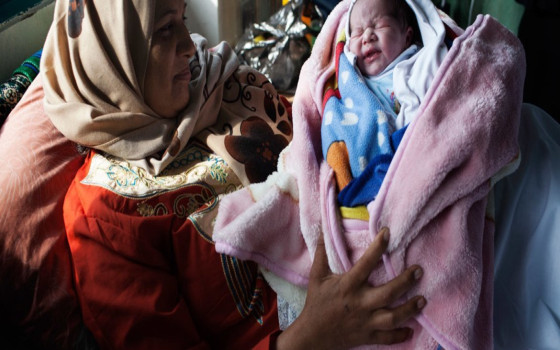
Gaza: 17,000 pregnant women on the brink of starvation, high risk of miscarriage and childbirth deaths

- Europe and Arabs
- Friday , 11 October 2024 12:13 PM GMT
Gaza - New York: Europe and the Arabs
Nestor Owomuhangi, the representative of the United Nations Population Fund in Palestine, warned that more than 17,000 pregnant women are on the brink of starvation, while 11,000 pregnant women are already living in famine-like conditions.
Nestor Owomuhangi said that malnutrition and anxiety are hindering breastfeeding for three-quarters of new mothers, at a time when baby milk is not available.
This came during a briefing he gave, via video, to journalists in New York, yesterday, Thursday, following a recent eight-day visit to the Gaza Strip, where he saw firsthand the dire conditions facing women and girls, including the difficulties faced by pregnant women and the population in general.
He explained that overcrowding in shelters and lack of hygiene have exacerbated the plight of women in Gaza, where nearly 700,000 women and girls lack sanitary products to deal with their menstrual cycle.
He said that the level of destruction and suffering he saw in Gaza is unprecedented compared to the three decades he spent in the field of humanitarian work in conflict areas. Omuhangi detailed the worsening plight of pregnant women, with 49,000 currently pregnant and 4,000 due to give birth soon. The scarcity of pre- and post-natal care has exacerbated the risk of miscarriage and childbirth deaths.
With the healthcare infrastructure in shambles, only 16 of the 36 hospitals in the Strip are partially functioning, and three of them are on the verge of closure due to evacuations.
He added: “During my visit to the intensive care unit at Nasser Hospital in Khan Younis, I saw three newborns sharing an incubator, and the staff told me that these babies are actually the lucky ones. Doctors at Nasser Hospital and at the International Medical Corps field hospital told me that they are seeing an increasing rate of miscarriages as well as heart defects among newborns.”
The risk of aid programmes being cut short
He highlighted the massive destruction, loss of life and despair that has befallen Gaza’s 2.1 million people. He also highlighted the horrific statistics, noting that 5% of Gaza’s population has been killed, injured or missing, 96% of the population is affected by hunger, and millions have been displaced, multiple times, noting that one person told him he had been displaced 15 times.
He added: “In Deir al-Balah in central Gaza, I met young Gazans who told me that when the war ends they will not want to stay in Gaza because they no longer see any hope for themselves in Gaza. They showed me pictures of Gaza before and after the war and told me they could not believe they were leaving the Gaza they loved more than anything else.”
The humanitarian situation is rapidly deteriorating, with public anger mounting and threats to humanitarian workers increasing as they struggle to meet the needs of the population. He warned that the collapse of public order is a serious concern, raising fears that aid programmes will be cut off.
Given Hope
Despite the bleak situation in Gaza, Mr. Nestor Owomuhangi pointed to reasons for hope, praising the efforts of health workers who continue to provide care amid the chaos.
For example, a UNFPA-supported mobile maternity unit in central Gaza performed 96 caesarean sections in September, providing vital services to pregnant women.
UNFPA’s efforts enabled 45,000 safe deliveries last year, two-thirds of the 60,000 deliveries in Gaza. These services were provided through mobile maternity units, reproductive health supplies, and midwives deployed in shelters for displaced people.
Three immediate steps
Owomuhangi identified three urgent needs:
First, the continued flow of humanitarian and commercial goods into Gaza is critical. UNFPA trucks carrying essential medical supplies, including tens of thousands of sanitary pads, have been stuck in El Arish for more than two weeks.
He noted that Israeli authorities blocked or denied 87% of the 588 humanitarian flights planned in September.
Secondly, aid and health workers need protection, as Gaza has become the most dangerous place for humanitarian workers, with over 300 colleagues killed. In this regard, he expressed grave concern about the situation of health workers and patients at the Indonesian Hospital, Al Awda Hospital and Kamal Adwan Hospital in northern Gaza, which have been ordered to evacuate. Thirdly and finally, Omuhangi called for an immediate ceasefire and a move towards the peace process.












No Comments Found